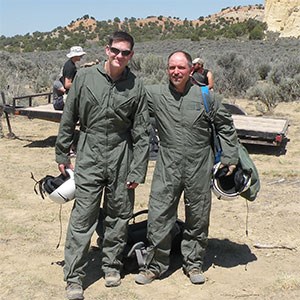Part of a series of articles titled Meet A Paleontologist.
Article
Dr. Alan L. Titus, Bureau of Land Management

What is your job, and what do you study?
As my title suggests, I'm the paleontologist responsible for all aspects of the paleontology resource program. This involves administering permits, coordinating and conducting research, managing partnerships with universities and museums across the country, running the paleontology lab (with the help of a lab manager), conducting field surveys and excavations, and doing lots of public outreach (lectures, tours, articles, books, etc.).
What are you working on now?
I just finished editing a 625-page book on the Cretaceous of southern Utah, and am currently engaged in inventory of the Kaiparowits and Wahweap Formations (Cretaceous age with lots of dinos) and preparing a rare ankylosaur skull collected last year.
Where did you go to school? What were some of your favorite classes that you took?
What were some of your favorite classes that you took? I attended the University of Nevada Las Vegas for my undergraduate degree, and attend the University of Arkansas and Washington State University for my Masters and Doctoral degrees respectively. I really enjoyed mineralogy, criminal justice, and geomorphology. The paleontology class was also a lot of fun because I got to pick one of the field trips and we collected ammonites, one of my favorite fossils.
Was there an experience you had that made you realize you wanted to be a paleontologist?
One thing stands out pretty clear from my childhood that drew me into paleontology as a career. My father made a collection of extremely beautiful Devonian age trilobites (Phacops rana) while he was teaching at his first university job in Toledo, Ohio. I was fascinated by these "ghostly" monuments to a completely extinct group of organisms. I imagined what it would be like to hold a living trilobite in my hands. That's where my fascination with extinct life forms and ecosystems was born.
What is your most memorable experience working with fossils?
I've had so many its hard to narrow them down. Most of them involve finding something very rare, which is part of the allure of paleontology in the first place. The ever present possibility that you will make a world class discovery and significantly advance our state of knowledge. The most recent ones involve finding complete skulls of two new genera of ankylosaurs and the most complete Campanian age pachycephalosaurid skull ever found in the US.
Do you have any advice for aspiring paleontologists?
My suggestion is that you fuel your passion for the science in any way you can. Volunteer and get experience wherever you can. The field is tough to get into and jobs are few. Keep your grades high, try to impress your professors and peers (you never know when that will open a door for you), and stay focused and passionate about what you're doing. It helps if you've already decided what you want to research by the time you are an undergraduate because you can write a senior research thesis and present at a professional meeting.
Last updated: July 26, 2018
